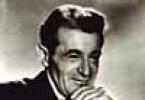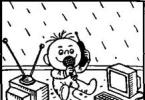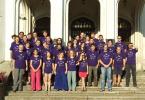One of my favorite songs has a simple story that can be disappointing...
On the one hand, telling such stories that debunk the romantic myth is almost the same as finding flaws in the appearance of the Mona Lisa, for example...On the other hand, it is curious. For me, this song, as for many, still remains a symbol of the fruitless but heroic struggle of the international brigades, in particular the Soviet one, in Spain.
Whatever you say, the poems are certainly talented... And the song stirs the soul. Indeed, it’s worth writing these lines - and you can know that you have done something very important in life, and not only for yourself, but also for many people.....So.....Grenada, Grenada, my Grenada... ..
GRENADA We rode at a pace, We raced in battles, And the “Apple” song was held in our teeth. Ah, this song is kept to this day by the young grass - Steppe malachite. But a different song About a distant land My friend carried with him in the saddle. He sang, looking around his native land: “Grenada, Grenada, my Grenada!” He repeated this song by heart... Where did the lad get Spanish sadness? Answer, Aleksandrovsk, I, Kharkov, answer: How long ago did you start singing in Spanish? Tell me, Ukraine, isn’t Taras Shevchenko’s Papakha lying in this rye? Where, my friend, does your song come from: “Grenada, Grenada, my Grenada”? He hesitates to answer, Dreamer-crest: - Brother! I found Grenada in a book. Beautiful name, high honor - Grenada parish in Spain! I left the hut, went to fight, to give the land in Grenada to the peasants. Farewell, dear ones, Farewell, friends - "Grenada, Grenada, my Grenada!" We rushed, dreaming of quickly comprehending the grammar of combat - the language of batteries. The sunrise rose and fell again, and the horse was tired of galloping through the steppes. But the “Apple” song was played by the squadron With the bows of suffering On the violins of time... Where, my friend, is your song: “Grenada, Grenada, my Grenada”? The broken body slid to the ground, the Comrade left the saddle for the first time. I saw: the moon bowed over the corpse, And the dead lips Whispered “Gren...” Yes. My friend went to a distant region, to a reach beyond the clouds, and took away the song. Since then, the Native Lands have not heard: “Grenada, Grenada, my Grenada!” The detachment did not notice the loss of the fighter, and finished the “Apple” song to the end. Only quietly across the sky Slided later onto the velvet of sunset A teardrop of rain... New songs Life came up with... No need, guys, to grieve about the song. No, no, no, no, friends... Grenada, Grenada, my Grenada! 1926 |
The poem, and later the song based on the verses of Mikhail Svetlov, “Grenada” is considered the most “Spanish” poem, the most “Spanish” Soviet song. However, despite widespread belief, it has nothing to do with the Spanish Civil War.
"Land to the peasants!" - one of the main slogans of the Russian revolution, implemented in practice only partially. The Ukrainian lad, who thanks to the revolution received a plot of land for use, taken with blood from the crooked landowner, is in no hurry to plow and sow, but continues to gallop across the steppes and swing a saber for the sake of a lofty goal - “the fight for the liberation of mankind.” Extrapolating the image invented by Svetlov, it is not difficult to assume that if the boy’s efforts are crowned with success and the peasants of “Grenada” find the long-awaited land, then their best representatives will not immediately cultivate it either, but will immediately leave their “huts” and go to fight for the liberation of the Congo from colonial oppression or for the sake of some other high and just goal. And so on in a chain without end - the liberated peoples immediately join the race with sabers drawn and rush somewhere, “dreaming of comprehending as soon as possible.” And the long-awaited piece of land at this time is scorched by the scorching Spanish sun and becomes unusable.
How did Svetlov’s “Grenada” appear, does it have anything to do with Spain? This is what Mikhail Svetlov himself said about this.
“In the depths of the yard I saw a sign: “Hotel Grenada”... Approaching the house, I began to hum: “Grenada, Grenada...” Who can hum like that? Not a Spaniard? It would be too primitive. Then who? When I opened the door, I already knew who would sing like that. Yes, of course, my dear Ukrainian lad. The poem was actually ready, all that remained was to write it, which is what I did."
Here's a simple story. A sign for a second-rate hotel (“in the back of the courtyard”), the semi-literate former owner of which was not even able to correctly reproduce the name of the Spanish province of Granada found in a book. Svetlov’s words that the Spaniard will not sing “Grenada, Grenada” have a double meaning. If Svetlov knew that in Spain there is a city of Granada and a province of the same name, then he is absolutely right, not a single Spaniard will distort this word. If Svetlov meant that this familiar and familiar name could not sink into the soul of any Spaniard, then he was very mistaken. Residents of any province of Spain idolize their land, their native lands and sincerely glorify them, first of all, in songs. For many decades, the songs “Granada” (now even Nikolai Baskov sings it in the original), “Valencia” and others have been sung. These are real hymns to our native lands, known throughout the world and not inferior in popularity to “Moscow Evenings”.

Mikhail Arkadyevich Svetlov
(17.06.1903 - 28.09.1964)
He would already have been great and remained in the history of literature and in the memory of people if he had not written anything except his two poems - “Grenada” and “Songs about Kakhovka”.
Very personal, sometimes intimate, Svetlov’s lines seem to penetrate you - they are yours:
Young people won't understand
our sad efforts.
Old people
perhaps they will understand.
The name of Mikhail Svetlov sounded throughout the country on August 29, 1926, when his poem “Grenada” was published in Komsomolskaya Pravda.
Years have passed. The wars have died down. But the romance of the ballad still stirred hearts. Many professional composers tried to make a song out of “Grenada”. Y. Meitus was the first to write music based on Svetlov’s poems, and this “Grenada” was sung by the young Klavdia Shulzhenko. Later, in 1977, Mikael Tariverdiev presented a cycle of songs based on poems by M. Svetlov, among which, of course, was “Grenada”.

There were better and worse options, but people knew one - the one composed in 1958 by Viktor Berkovsky, the future famous bard, and then a student at the Moscow Institute of Steel and Alloys from Zaporozhye. It’s as if this music has always been there, as if it was born along with the poetry. It was recognized and sung among students, and in 1965 the song was first heard on the radio. But Mikhail Arkadyevich was no longer alive.
Text
We walked at a pace
We raced in battles
And “Apple” - song
They held it in their teeth.
Oh, this song
Until now he keeps
Young grass -
Steppe malachite.But a different song
About a distant land
My friend drove
With you in the saddle.
He sang, looking around
Native lands:
"Grenada, Grenada,
Grenada is mine!He sings this song
Repeated it by heart...
Where did the lad come from?
Spanish sadness?
Answer, Alexandrovsk,
And, Kharkov, answer:
How long ago in Spanish
Have you started singing?Tell me, Ukraine,
Isn't it in this rye
Taras Shevchenko
Is the papakha lying down?
Where is it from, buddy?
Your song:
"Grenada, Grenada,
Grenada is mine"?He hesitates to answer
Dreamer-crest:
- Brother! Grenada
I found it in a book.
Beautiful name,
High honor -
Grenada parish
There is one in Spain!I left the house
I went to fight
So that the land in Grenada
Give it to the peasants.
Goodbye, dear ones!
Goodbye family!
"Grenada, Grenada,
Grenada is mine!We were racing, dreaming
Comprehend quickly
Combat grammar -
Battery language.
The sunrise was rising
And fell again
And the horse is tired
Jump through the steppes.But “Yablochko” is a song
The squadron played
With bows of suffering
On the violins of the times...
Where is it, buddy?
Your song:
"Grenada, Grenada,
Grenada is mine"?Broken body
Slipped to the ground
Comrade for the first time
I left the saddle.
I saw: over the corpse
The moon has bowed down
And dead lips
They whispered: “Grena...”Yes. To the distant region
Into the sky-high reach
My friend left.
And he took the song away.
Haven't heard since then
Native lands:
"Grenada, Grenada,
Grenada is mine!The squad didn't notice
Soldier losses
And the “Apple” song
Finished it to the end.
Only the sky is quiet
Slipped down after a while
On the velvet of sunset
A tear of rain...New songs
I invented life...
No need, guys.
To grieve about the song.
No need, no need
No need, friends...
Grenada, Grenada,
Grenada is mine!
- In the 19th century, the normative name for the city and province of Granada in southern Spain was “Grenada”. Since the beginning of the 20th century, this transcription has been gradually replaced by the variant “Granada”. The modern language uses the variant "Granada", and Grenada is an island nation in the Caribbean whose official language is English rather than Spanish.
- The poems were written long before the Spanish Civil War.
- The first quatrain of the song “We rode at a pace...” - epigraph to the song “Scarlet Wings” by Oleg Medvedev
Text
We rode at a pace, We raced in battles, And “Apple” - the song We held in our teeth. Ah, this song is kept to this day by the young grass - Steppe malachite. But a different song About a distant land My friend carried with him in the saddle. He sang, looking around his native land: “Grenada, Grenada, my Grenada!” He repeated this song by heart... Where did the lad get Spanish sadness? Answer, Aleksandrovsk, I, Kharkov, answer: How long ago did you start singing in Spanish? Tell me, Ukraine, isn’t Taras Shevchenko’s Papakha lying in this rye? Where, my friend, does your song come from: “Grenada, Grenada, my Grenada”? He hesitates to answer, Dreamer-crest: - Brother! I found Grenada in a book. Beautiful name, high honor - Grenada parish in Spain! I left the hut, went to fight, to give the land in Grenada to the peasants. Goodbye, dear ones! Goodbye family! “Grenada, Grenada, my Grenada!” We rushed, dreaming of quickly comprehending the grammar of combat - the language of batteries. The sunrise rose and fell again, and the horse was tired of galloping through the steppes. But the “Apple” song was played by the squadron With bows of suffering On the violins of times... Where, my friend, is your song: “Grenada, Grenada, my Grenada”? The broken body slid to the ground, the Comrade left the saddle for the first time. I saw: the moon bowed over the corpse, And the dead lips Whispered: “Grena...” Yes. My friend has gone to a distant region, to a sky-high stretch. And he took the song away. Since then, the Native Lands have not heard: “Grenada, Grenada, my Grenada!” The detachment did not notice the loss of a fighter and finished the “Apple” song to the end. Only quietly across the sky Slided later onto the velvet of sunset A teardrop of rain... New songs Life came up with... No need, guys, to grieve about the song. No, no, no, no, friends... Grenada, Grenada, my Grenada!
Links
Notes
Wikimedia Foundation. 2010.
See what “Grenada (song)” is in other dictionaries:
Grenada: Grenada is an island country in the southeast Caribbean Sea, one of the smallest countries in the world. Grenada is an island in the Caribbean Sea. Grenada is an obsolete Russian name for the province of Granada in Spain Grenada ... ... Wikipedia
Genus. 1903, d. 1964. Poet, playwright. Author of poems, many of which became folk songs ("Grenada", "Song of Kakhovka"), "Horizon" (collection of lyric poetry, 1959), "Hunting Lodge" (collection... ... Large biographical encyclopedia
Mikhail Arkadyevich (1903 1964), Russian poet, playwright. Poems of the mid-20s and 30s. marked by a romantic perception of the events of the Civil War and Komsomol youth (including Grenada, Song of Kakhovka, which became popular songs). Lyrical... ...Russian history
Svetlov, Mikhail Arkadevich- Mikhail Arkadyevich Svetlov. SVETLOV Mikhail Arkadyevich (1903 64), Russian poet. Poems from the mid-20s to the 30s. marked by a romantic perception of the events of the Civil War and Komsomol youth (Grenada, Song of Kakhovka). Lyrical plays (… … Illustrated Encyclopedic Dictionary
Svetlov M. A.- SVETLOV Mikhail Arkadievich (19031964), Russian. poet, playwright. Poems ser. 2030s marked romantic. perception of events Civil. war and Komsomol youth (including Grenada, Song about Kakhovka, which became popular songs). Lyric... ... Biographical Dictionary
SVETLOV Mikhail Arkadievich- Mikhail Arkadyevich (19031964), Russian. poet, playwright. Poems ser. 2030s marked romantic. perception of events Civil. war and Komsomol youth (including Grenada, Song about Kakhovka, which became popular songs). Lyric. plays (... ... Biographical Dictionary
Literature Multinational Soviet literature represents a qualitatively new stage in the development of literature. As a definite artistic whole, united by a single social and ideological orientation, community... ...
RSFSR. I. General information The RSFSR was founded on October 25 (November 7), 1917. It borders on the north-west with Norway and Finland, on the west with Poland, on the south-east with China, the MPR and the DPRK, as well as on the union republics included to the USSR: to the west with... ... Great Soviet Encyclopedia
We walked at a pace
We raced in battles
And the “Apple” song
They held it in their teeth.
Oh, this song
Until now he keeps
Young grass -
Steppe malachite.
But a different song
About a distant land
My friend drove
With you in the saddle.
He sang, looking around
Native lands:
"Grenada, Grenada,
Grenada is mine!
He sings this song
Repeated it by heart...
Where did the lad come from?
Spanish sadness?
Answer, Alexandrovsk,
And Kharkov, answer:
How long ago in Spanish
Have you started singing?
Tell me, Ukraine,
Isn't it in this rye
Taras Shevchenko
Is the papakha lying down?
Where is it from, buddy?
Your song:
"Grenada, Grenada,
Grenada is mine"?
He hesitates to answer
Dreamer-crest:
- Brother! Grenada
I found it in a book.
Beautiful name,
High honor -
Grenada parish
There is one in Spain!
I left the house
Went to fight
So that the land in Grenada
Give it to the peasants.
Goodbye, dear ones!
Goodbye family!
"Grenada, Grenada,
Grenada is mine!
We were racing, dreaming
Comprehend quickly
Combat grammar -
Battery language.
The sunrise was rising
And fell again
And the horse is tired
Jump through the steppes.
But “Yablochko” is a song
The squadron played
With bows of suffering
On the violins of times...
Where is it, buddy?
Your song:
"Grenada, Grenada,
Grenada is mine"?
Broken body
Slipped to the ground
Comrade for the first time
I left the saddle.
I saw: over the corpse
The moon has bowed down
And dead lips
They whispered: “Grena...”
Yes. To the distant region
Into the sky-high reach
My friend left
And he took the song away.
Haven't heard since then
Native lands:
"Grenada, Grenada,
Grenada is mine!
The squad didn't notice
Soldier losses
And the “Apple” song
Finished it to the end.
Only the sky is quiet
Slipped down after a while
On the velvet of sunset
A tear of rain...
New songs
I invented life...
No need, guys.
To grieve about the song,
No need, no need
No need, friends...
Grenada, Grenada,
Grenada is mine!
Analysis of the poem “Grenada” by Svetlov
The poem “Grenada” was written by Mikhail Svetlov in 1926 and published the same year in Komsomolskaya Pravda, and was favorably received by readers. It was recited from the stage by V. Mayakovsky, and M. Tsvetaeva admired it in correspondence with B. Pasternak.
In “Grenada,” the action takes place during the Russian Civil War, of which M. Svetlov was personally a participant, so the theme of a detachment rushing through battle is familiar to him. According to the author’s recollections, the reason for the appearance of Spanish motifs in the patriotic work was the “great sense of internationalism” he had accumulated.
The poem is written in the ballad genre, the narration comes from the point of view of the author, who is watching the main character, his comrade. From stanza to stanza the story of a fighter is told, dreaming of an incomprehensible and incomprehensible Grenada, the longing for which is expressed in the song:
He sang, looking around
Native lands:
"Grenada, Grenada,
Grenada is mine!
“Where does the lad get Spanish sadness?” - the author asks the question, posing it both to his native land and to his friend. The fighter replies that he got his thoughts about Grenada from a book and tells the narrator:
I left the house
I went to fight
So that the land in Grenada
Give it to the peasants.
The revolutionary spirit, the desire to eradicate injustice, forces the hero to leave his native land and move forward with the detachment. The work is filled with this movement - to the loud choral “Apple” and the quiet “Grenada” the detachment “rushes”, the sunrise “falls and rises again”, the horse gets tired of galloping across the steppe. And the author’s comrade leaves the saddle for the first time only when he is struck down by an enemy invisible to the reader. Along with life, the song ends: “Grena...”
The detachment did not notice this loss, but the narrator is sad and finds support for his grief in nature - rain at sunset. In the last stanza, the author persuades readers not to regret the song, but as if unable to restrain himself, he begins to sing it again. The rhythmic organization of the poem is characteristic of Russian folklore and evokes associations with some folk motifs.
Having been sung for the first time during the Civil War in Russia, the poem continued to live in the mouths of soldiers during the Civil War in Spain, and then by prisoners of the Mauthausen concentration camp, who made it their anthem. More than 20 versions of melodies were written for this text, the most famous one in 1965 by the bard V. Berkovsky, almost 40 years after the first publication. Thus, the longing of a dreamy fighter for a distant, unknown and inaccessible country echoes in listeners decades later.




